IZA Young Labor Economist Award
The IZA Young Labor Economist Award was presented from 2006–2021 for the best journal publication by young labor economists. With this prize, IZA honored outstanding labor economist whose doctoral degree was received in the past 15 years.
The selection process started with nominations solicited from the IZA Network and submitted by IZA Research Fellows. The nominations were then screened by the IZA Prize Selection Committee and a winner, or a pair of joint winners, were chosen.
The establishment of this award reflected IZA's strong ambition to support young and aspiring academics. It was meant to provide an additional incentive for this group to conduct high-quality research in labor economics.
2021 YLEA winner:
Patrick Kline (University of California, Berkeley) received the 2021 IZA Young Labor Economist Award for his research on empirical methodology in labor economics and on the determination of wages.
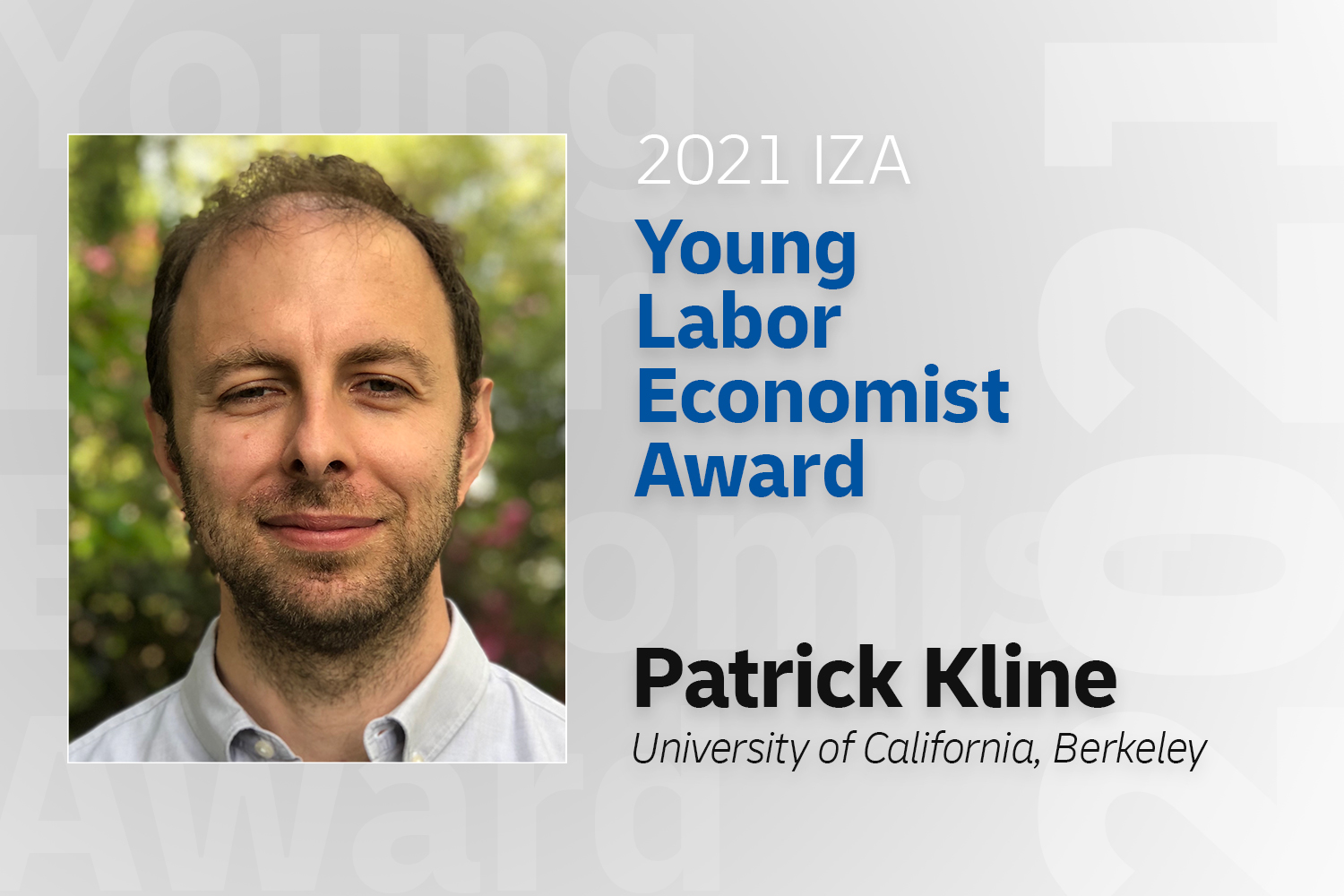
“The Award typifies the interaction of economic ideas with the development of proper tools to frame their measurement,” said Daniel Hamermesh, who chairs the IZA Prize Committee. The committee selecting the awardee consisted of Joseph Altonji (Yale), Oriana Bandiera (LSE), Richard Blundell (UCL), George Borjas (Harvard), Pierre Cahuc (Sciences Po), and Claudia Goldin (Harvard).
The 2021 IZA Young Labor Economist Award was conferred during the ASSA 2022 Virtual Annual Meeting on January 7.
Read more in the IZA Newsroom!
Past YLEA winners:
2019: Leah Platt Boustan (Princeton University), Philipp Kircher (University of Edinburgh)
The 2019 IZA Young Labor Economist Award goes to Leah Platt Boustan (Princeton University) for her historical research on immigration, and to Philipp Kircher (University of Edinburgh and European University Institute) for his work on search, sorting and matching in labor markets.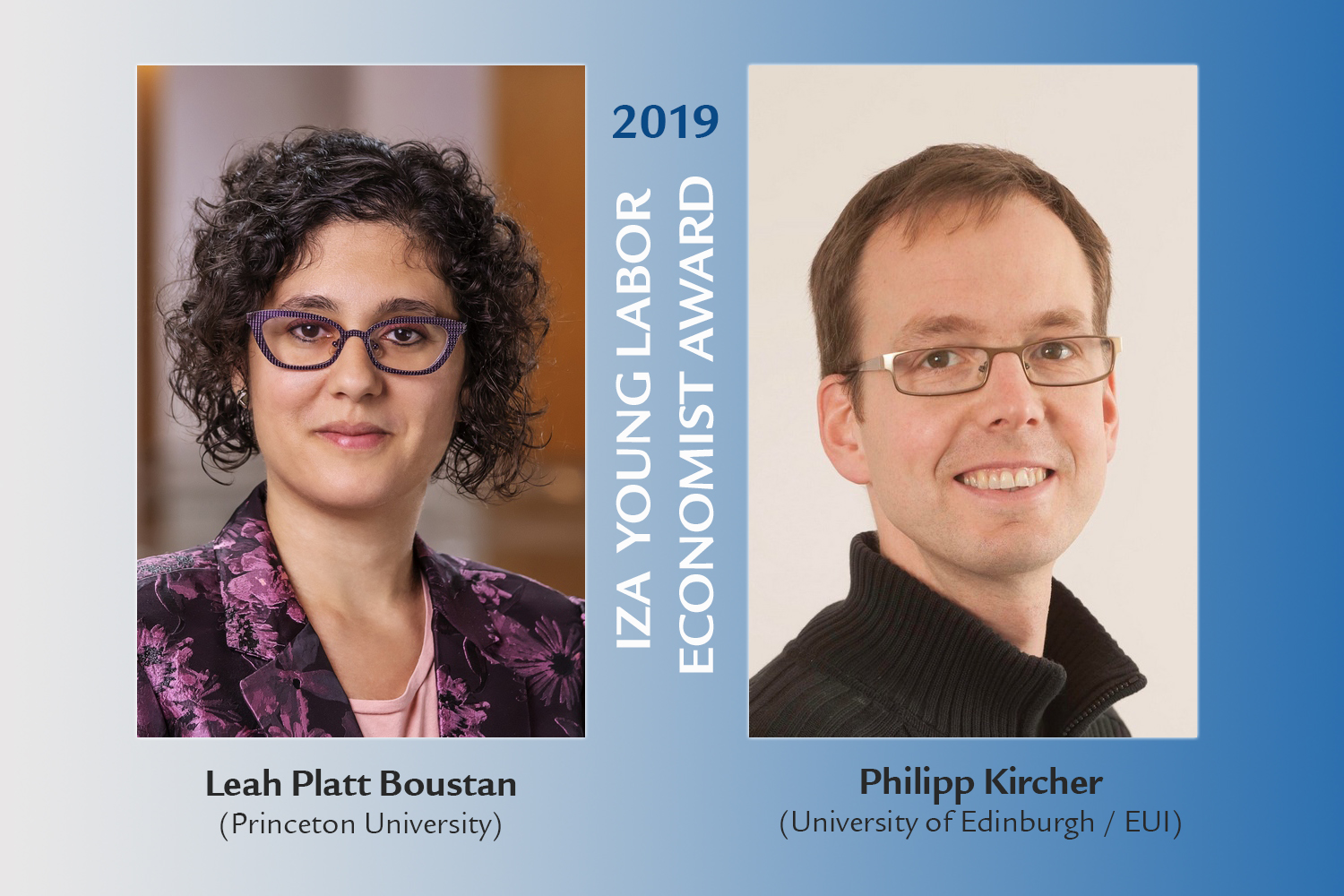
Leah Platt Boustan's research lies at the intersection between economic history and labor economics. Her recent work has been on the mass migration from Europe to the United States in the late nineteenth and early twentieth centuries. Philipp Kircher focuses his research on the consequences of search frictions in labor markets, in particular regarding wage setting and assignment of workers to jobs.
Read more in the IZA Newsroom!
2017: Magne Mogstad (University of Chicago)

Magne Mogstad
Magne Mogstad, the Gary S. Becker Professor in Economics at the University of Chicago, has been selected as the recipient of the 2017 IZA Young Labor Economist Award. According to Daniel S. Hamermesh, Professor at Royal Holloway University of London and Editor-in-Chief of IZA World of Labor, the award is a “modest recognition of the remarkable amount that Mogstad has already achieved.” He has contributed major studies in such diverse areas as the economics of the family, human capital, econometrics of labor issues, and others. The breadth of the topics analyzed is matched by the depth of the contribution in each area.
Read more in the IZA Newsroom!
2015: Reed Walker (University of California, Berkeley)

Reed Walker
At the traditional IZA reception during the Annual Meeting of the Allied Social Science Associations (ASSA), held in San Francisco in January 2016, the 2015 IZA Young Labor Economist Award was presented to Reed Walker (University of California, Berkeley) for his article "The Transitional Costs of Sectoral Reallocation: Evidence from the Clean Air Act and the Workforce" (Quarterly Journal of Economics, 2013).
Read more in the IZA Newsroom!
2014: Brian Kovak (Heinz College, Carnegie Mellon University)
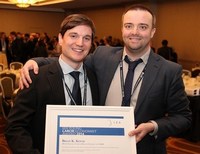
Brian Kovak | Corrado Giulietti
At the traditional IZA reception during the Annual Meeting of the Allied Social Science Associations (ASSA), held in Boston in January 2015, IZA Research Director Corrado Giulietti presented the 2014 IZA Young Labor Economist Award to Brian K. Kovak (Heinz College, Carnegie Mellon University) for his article "Regional Effects of Trade Reform: What is the Correct Measure of Liberalization?", American Economic Review, 2013, 103(5), 1960-1976.
2013: Martha Bailey (University of Michigan), Brad Hershbein (Upjohn Institute), Amalia Miller (University of Virginia)
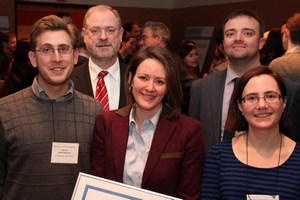
B. Hershbein | K. F. Zimmermann | M. Bailey | C. Giulietti | A. Miller
At the traditional IZA reception during the Annual Meeting of the Allied Social Science Associations (ASSA), held in Philadelphia in January 2014, IZA Director Klaus F. Zimmermann and Research Director Corrado Giulietti presented the 2013 IZA Young Labor Economist Award to Martha Bailey (University of Michigan), Brad Hershbein (Upjohn Institute) and Amalia Miller (University of Virginia) for their article "The Opt-In Revolution? Contraception, Fertility Timing and the Gender Gap in Wages" (American Economic Journal: Applied Economics, 2012, 4 (3), 225-254).
The award-winning paper is a prime example of how careful empirical research can enhance our understanding of the functioning of labor markets. The paper starts out from a classic and long-standing puzzle in labor economics – the gender wage gap and the question what determines whether the gap widens or declines. The paper then comes up with a creative and original hypothesis about a potential driver of the wage gap. Finally, the authors combine a large amount of data from various sources to convincingly show that their hypothesized mechanism is actually empirically relevant.
The puzzle to be explained is why the gender wage gap, after being relatively stable for about 30 years, declined rapidly and substantially in the 1980s. The authors hypothesize that the introduction of "the Pill" played an important role in this reduction. Oral contraception could be relevant for women's life-time earnings, for instance, because it changed women's incentives to invest in education, it allows them to accumulate more labor market experience, and it could change the type of jobs that women select into.
To test the influence of the Pill on the gender wage gap, the authors follow a sample of U.S. women who were born in 1943-1954 and who were interviewed by the National Longitudinal Survey of Young Women at several points in time from 1968 onwards. Some of these women lived in U.S. states where legal access to the Pill under age 21 was introduced earlier than in other states. The authors use these differences in early legal access to test whether and why the Pill really had a causal impact on the women's labor market experience.
The paper demonstrates that early legal access had indeed a dramatic impact on several important outcomes in the life of these women. In particular, the authors show that women who had early legal access to the Pill were more likely to be enrolled in school in their early 20s and had reached higher levels of education at age 25. Consistent with greater school enrollment, these women had lower labor force participation rates and work hours in their early 20s, but they worked more afterward, so that by their early 40’s they had cumulated higher levels of work experience. Women with early legal access also received more formal job training and were more likely to work in professional occupations and in jobs that were traditionally "non-female occupations". The greater human capital investments and the higher labor market participation led to steeper wage profiles and higher overall wages. By age 50, the women with early legal access to the Pill earned as much as 8 percent higher hourly wages.
The authors also go on to explore the precise mechanisms behind these overall effects. Interestingly, they find that effects of the Pill on work experience and life-cycle wages are largest for women in the middle of the IQ distribution. This suggests that the narrowing of the gender gap in the 1980s can be traced back to a revolution in the flexibility and family planning possibilities that the Pill brought about, and that allowed these women to "opt into" the labor market and have well-paid jobs.
In sum, the paper provides important new insights on the reasons behind the observed trends in the gender wage gap. It also enhances our understanding of the links between fertility, education, and life-cycle wages, more generally.
2012: Scott Carrell (UC Davis), Mark Hoekstra (Texas A&M)
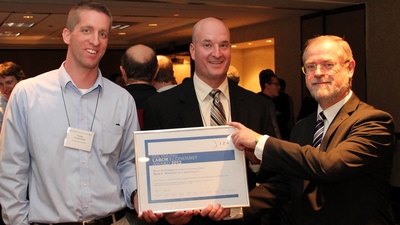
Mark Hoekstra | Scott Carrell | Klaus F. Zimmermann
At the traditional IZA reception during the Annual Meeting of the Allied Social Science Associations (ASSA), held in San Diego in January 2013, IZA Director Klaus F. Zimmermann presented the 2012 IZA Young Labor Economist Award to Scott Carrell (UC Davis) and Mark Hoekstra (Texas A&M) for their article "Externalities in the Classroom: How Children Exposed to Domestic Violence Affect Everyone's Kids" (American Economic Journal: Applied Economics, 2010).
The award-winning paper studies whether children from troubled families generate negative spillovers on the educational achievements of their peers. The authors constructed a unique dataset in which children’s school records are matched to domestic violence cases from court records in a Florida county. They find that about 5% of the children in their sample are exposed to domestic violence. This implies that about 70% of the classes have at least one kid that has been exposed to domestic violence. The academic records show that children from troubled homes not only have lower test scores themselves, but they also decrease the performance of their peers. There is a statistically significant reduction in math and reading test scores and a significant increase in misbehavior at school, relative to classes without troubled children. Troubled boys and children from low-income families are the main drivers of these negative spillovers: Adding one more troubled boy to a classroom of 20 students increases the number of disciplinary infractions committed by other boys by 40 percent. These findings have important implications for education policy. They provide clean and strong evidence of the "bad apple" effect. The paper also shows that addressing family violence has a double dividend – while improving the life of the most troubled students, it can also positively affect these children’s peers.
2011: Johannes Abeler (University of Oxford), Steffen Altmann (IZA), Sebastian Kube (University of Bonn), Mathias Wibral (University of Bonn)
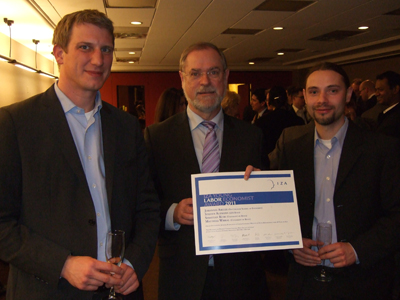
Steffen Altmann | Klaus F. Zimmermann | Matthias Wibral
At the 2012 ASSA meeting in Chicago, IZA Director Klaus F. Zimmermann presented the 2011 IZA Young Labor Economist Award to the authors of the article "Gift Exchange and Workers' Fairness Concerns: When Equality Is Unfair" (Journal of the European Economic Association, 2010). Representing the team of authors, which also included Johannes Abeler and Sebastian Kube, Steffen Altmann and Matthias Wibral attended the award ceremony in Chicago.
The award-winning paper shows that a simple request for equal wages may be neither efficient nor fair. The authors analyze the interaction between reciprocity as a contract enforcement device and modes of payment. In the experiment principals employ two agents who put forward effort prior to receiving their wage. In one treatment the principal can determine individual wages for the two agents (after observing their effort); in the other the principal has to pay the same wage to both workers. The results show that efficiency is quite high in both treatments, but considerably higher in the treatment where wages can be targeted individually. The reason is that workers who have provided higher efforts perceive wage equality as unfair. This in turn induces them to lower their effort. In other words, if agents work differently hard, an equal wage is detrimental for reciprocity as a contract enforcement device. This finding has important implications for the complex interaction of modes of payment and contract enforcement in the presence of social norms.
2010: Raj Chetty (Harvard University)
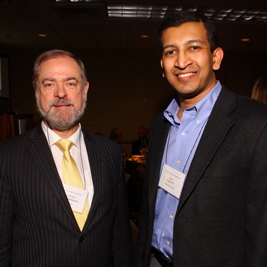
Klaus F. Zimmermann | Raj Chetty
Raj Chetty (Harvard University) received the 2010 YLEA for his paper "Moral Hazard Versus Liquidity and Optimal Unemployment Insurance" (Journal of Political Economy, 2008, 116 (2), 173-234). The award was announced by IZA Research Director Marco Caliendo during the gala dinner in honor of IZA Prize Laureate Francine Blau at the ASSA Annual Meeting in Denver, Colorado, in January 2011.
Honoring for the fifth time the best paper of the past two years written by young labor economists, reflects IZA's strong ambition to support young and aspiring academics and to provide an additional incentive for this group to conduct high-quality and policy-relevant research in the field of labor economics. Chetty’s paper has “greatly influenced our view of unemployment benefits and social insurance programs,” said Caliendo in his laudation.
Raj Chetty received his Ph.D. from Harvard University in 2003. In the same year, he moved to Berkeley where he became a full professor in 2008. Since 2009, he is back in Harvard as a full professor at the Economics Department and as the Director of the Lab for Economic Applications and Policy. His papers have been published in outlets such as the AER, the JPE, or the QJE. He is currently also serving as Editor for the Journal of Public Economics and as Co-Director of the Public Economics Program at the NBER.
2009: Alexandre Mas (Princeton University)
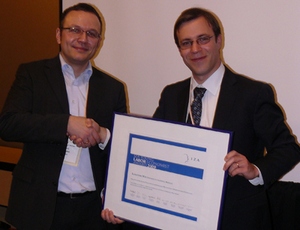
Marco Caliendo | Alexandre Mas
The 2009 IZA Young Labor Economist Award was awarded to Princeton University professor Alexandre Mas for his outstanding paper on "Labour Unrest and the Quality of Production: Evidence from the Construction Equipment Resale Market", (Review of Economic Studies Vol. 75 (1), 2008, 229-258).
IZA Research Director Marco Caliendo presented the award to Mas during the ASSA annual meetings in Atlanta on January 4, 2010. The award reflects IZA's strong ambition to support young and aspiring academics. Mas' study "is a pioneering paper that shows how important psychological factors such as work morale may be for firms' productivity and profitability," said Caliendo in his laudation.
Alexandre Mas earned his Ph.D. from Princeton University in 2004. In 2004 he joined the Haas School of Business and the Department of Economics at the University of California, Berkeley, as an Assistant Professor and became an Associate Professor in 2008. In 2009, he returned to Princeton as Professor of Economics and Public Affairs. He is currently on leave to serve as the Chief Economist of the U.S. Department of Labor.
2008: Fabian Lange (Yale University)
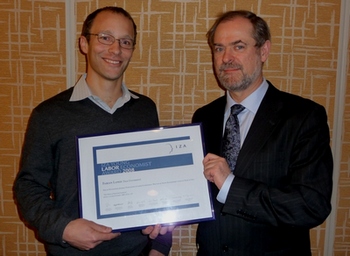
Fabian Lange | Klaus F. Zimmermann
On January 4, 2009, IZA Director Klaus F. Zimmermann presented the third IZA Young Labor Economist Award to Fabian Lange (Yale University) during an IZA reception held at the Annual Meetings of the Allied Social Science Associations (ASSA) in San Francisco. The award honors an outstanding paper published by young labor economists under the age of 40. The selection committee – consisting of Zimmermann and the IZA Program Directors – chose Lange's contribution on "The Speed of Employer Learning" (Journal of Labor Economics, 2007) from a large number of nominations submitted by IZA Research Fellows and Affiliates.
During the award ceremony, Zimmermann said the selected paper "demonstrates impressively how the combination of careful theoretical analysis and rigorous empirical work can provide new insights into important labor market questions." The paper proposes a model to estimate the speed at which employers learn about the actual productivity of job entrants hired on the basis of signals such as schooling. The empirical analysis suggests that employers learn fast, with initial expectation errors declining by 26% in the first year and about 50% within three years. Lange also shows that signaling accounts for less than 15% of the overall gains from an additional year of schooling.
In his acceptance speech, Fabian Lange thanked his advisors at the University of Chicago and Yale who have inspired his award-winning work. As a German scholar in the United States, he also acknowledged IZA's role as a "bridge between the European and American research communities."
2007: Oriana Bandiera (London School of Economics), Iwan Barankay (University of Warwick), Imran Rasul (University College London)
IZA Young Labor Economist Award presented in New Orleans
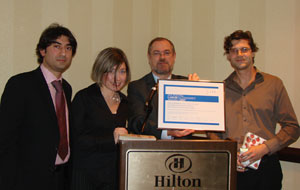
I. Rasul | O. Bandiera | K. F. Zimmermann | I. Barankay
On January 5, 2008, IZA Director Klaus F. Zimmermann presented the second IZA Young Labor Economist Award to Oriana Bandiera (London School of Economics), Iwan Barankay (University of Warwick) and Imran Rasul (University College London) during an IZA reception held at the Annual Meetings of the Allied Social Science Associations (ASSA) in New Orleans. The award honors an outstanding paper published by young labor economists under the age of 40. The selection committee – consisting of Zimmermann and the six IZA Program Directors – chose their joint paper "Social Preferences and the Response to Incentives: Evidence from Personnel Data" (Quarterly Journal of Economics, 2005) from a large number of nominations submitted by IZA Research Fellows.
During the award ceremony, Zimmermann said the selection committee was impressed with the "originality of the research approach, the methodological rigor and the thorough analysis of the data" in the prize-winning paper, which has important implications for the design of incentive schemes: Analyzing personnel data from a UK farm, the authors found that due to the workers' social preferences their daily productivity was at least 50% higher under piece rates compared to relative performance incentives.
In his acceptance speech, Barankay thanked the community of labor economists for nominating the paper, as well as the "142 fruit pickers without whom our research would not have been possible."
2006: Enrico Moretti (University of California, Berkeley)
Enrico Moretti receives First IZA Young Labor Economist Award
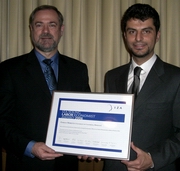
K. F. Zimmermann | E. Moretti
On January 6, 2007, IZA Director Klaus F. Zimmermann presented the first IZA Young Labor Economist Award to Enrico Moretti (University of California, Berkeley) during an IZA reception held at the Annual Meetings of the Allied Social Science Associations (ASSA) in Chicago. This newly established prize is awarded for an outstanding paper published by young labor economists under the age of 40. The selection committee – consisting of Zimmermann, IZA Research Director Armin Falk and six IZA Program Directors – chose Moretti's paper "Estimating the Social Return to Higher Education: Evidence from Longitudinal and Repeated Cross-Sectional Data" (Journal of Econometrics, 2004) from a large number of nominations submitted by IZA Research Fellows.
During the award ceremony, Zimmermann stated the selection committee was impressed by the "scientific originality, methodological rigor and policy relevance" of the paper, which provided evidence that the social return to education may in fact exceed the private return. In his acceptance speech, Moretti declared he felt extremely honored to receive this inaugural award from an "institute that has in just a few years established itself at the forefront of international research in labor economics."